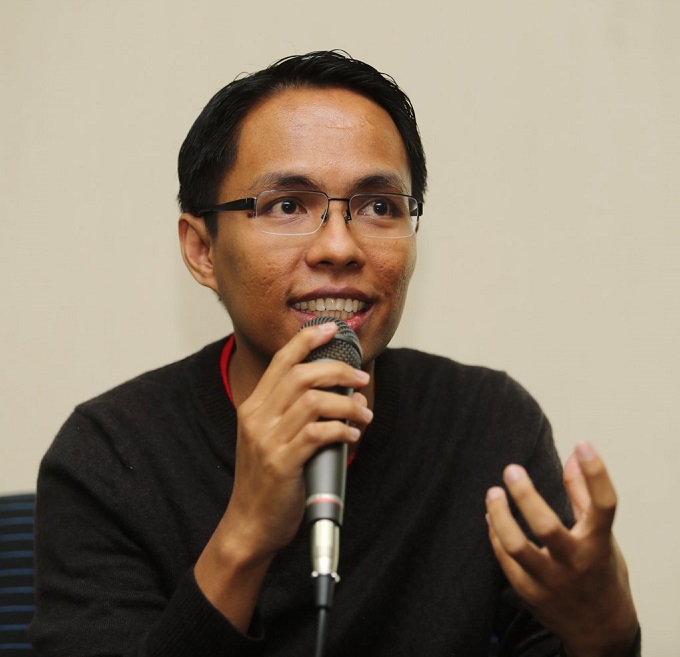Disrupt: Heartfelt lessons, honesty and founder war stories: Page 2 of 2
By A. Asohan April 24, 2014
 From techie to manager
From techie to manager
Slashes & Dots' JomSocial’s Azrul (pic) meanwhile started as an investment analyst in 2002, but it took him only one-and-a-half years before he realised that this wasn’t what he wanted to do with his life, so he and his wife founded a software company in a “dingy office” in suburban Subang Jaya, hiring a third person as a developer.
The company hit US$1 million in revenue within five or six years, and had grown then to about 40 employees. How did he make that transition to managing people?
“It was very hard for me because I was from a technical background, and you know engineers – all we want to do is build things.
“One bad thing about founders who are engineers is that we spend too much time building things, and not enough time selling or marketing. For many years, I fell into the trap because I liked building things so much.
“Even when we were building our tech team, I overstepped my boundary – instead of encouraging them, guiding them and believing in them, I would tell them exactly what to do,” he said.
Azrul said it took him a long time to realise that the only way he could build more things as an engineer was to work with other people.
“And that’s it – my motivation to change from an engineer to a manager was really a selfish one: I wanted to build more things!
“I think in a lot of areas, that’s what entrepreneurs do. We just do what needs to be done. In my case, because I had to build a lot of things, I had to build a new mentality first, to [be assured] that the team could actually do things without me.
“Throughout my years, I did a lot of things wrong. I should have learned to bite my tongue [and let them get on with their jobs].
“Managing a marketing team was relatively easy because I hated doing marketing, so I let them do whatever they wanted to do [to get the job done],” he added.
This mind-set change to leave the technical team to its work “took a lot of conscious training,” said Azrul. “It was like a muscle, I had to exercise it every day.”
It was different for Aaron, who had had experience managing people in his previous ventures.
“But I never had to manage more than 20 people. Once you scale past 20 people, all the awesome Github-like culture just goes out the window. You need structure, you need processes,” he said.
“We still want to maintain the culture, at least within the product and tech team,” he added.
He conceded that structure and processes would be needed in certain departments, but the main thing is for everyone in the company to strive for common goals.
“We only have two goals in MyTeksi: No 1 is to help drivers make more money, and No 2 is to help female passengers feel safer when they take taxis. Everything we do is based on these two goals,” said Aaron.
“If we want to spend money on some advertising or want to partner somebody, we ask ourselves: Does this partnership increase revenue for drivers? Does this partnership make women safer?” he added.
Fire in the belly
 When asked by moderator Karamjit on how founders can keep themselves emotionally charged through all their ups and downs, MaGIC’s Yeoh (pic) did not hesitate.
When asked by moderator Karamjit on how founders can keep themselves emotionally charged through all their ups and downs, MaGIC’s Yeoh (pic) did not hesitate.
“Seriously, I think entrepreneurship is really the one single thing which gives you life’s lessons, where you mature and become a better person because you learn so much about yourself, and what you stand for.
“It builds character and personality. Ultimately, you have to be passionate about what you’re working on, and the problem you’re solving,” she said.
Yeoh said that the money wasn’t the only reason why she sold her second venture to Walmart Labs, part of the US retail giant.
“It’s funny … when I started I was full of passion over my idea, but over time I realised that this was not a business I wanted to spend the next 10 years of my life building.
“I was passionate about building a company, but this [business] was just an idea that came and stuck, and not what I wanted to become known for. This was not truly me,” she said.
Her new role as MaGIC CEO would at least mean she has the opportunity to make a difference.
Tomorrow: IP, fighting the money men, and wooing talent
Related Stories:
Disrupt#17: Leadership lessons from startups
Disrupt: Founders are not perfect, but it’s okay
Week in Review: Leadership lessons from Jobs, or Picard?
MaGIC CEO: I’m not about fluff or hype
For more technology news and the latest updates, follow us on Twitter, LinkedIn or Like us on Facebook.


